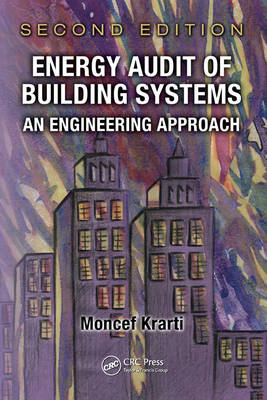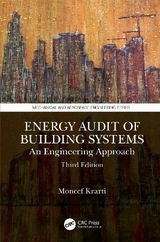
Energy Audit of Building Systems
Crc Press Inc (Verlag)
978-1-4398-2871-7 (ISBN)
- Titel erscheint in neuer Auflage
- Artikel merken
Buildings account for almost half of total primary energy use and related greenhouse emissions worldwide. Although current energy systems are improving, they still fall disappointingly short of meeting acceptable limits for efficiency.
Well-trained energy auditors are essential to the success of building energy efficiency programs—and Energy Audit of Building Systems: An Engineering Approach, Second Edition updates a bestselling guide to helping them improve their craft. This book outlines a systematic, proven strategy to employ analysis methods to assess the effectiveness of a wide range of technologies and techniques that can save energy and reduce operating costs in residential and commercial buildings.
Useful to auditors, managers, and students of energy systems, material is organized into 17 self-contained chapters, each detailing a specific building subsystem or energy efficiency technology. Rooted in established engineering principles, this volume:
Explores state-of-the-art techniques and technologies to reduce energy consumption in buildings
Lays out innovative energy efficiency technologies and strategies, as well as more established methods, to estimate energy savings from conservation measures
Provides several calculation examples to outline applications of methods
To help readers execute and optimize real building energy audits, the author presents several case studies of existing detailed energy audit reports. These include results from field testing, building energy simulation, and retrofit analysis of existing buildings, with recommendations based on sound economic analysis. Examining various subsystems, such as lighting, heating, and cooling systems, it provides an overview of basic engineering methods used to verify and measure actual energy savings attributed to energy efficiency projects. The author presents simplified calculation methods to evaluate their effectiveness and ultimately improve on them. Ideal either as a professional reference or a text for continuing education courses, this book fortifies readers’ understanding of building energy systems, paving the way for future breakthroughs.
Dr. Moncef Krarti, Ph.D, PE, LEED®AP, is professor, associate chair, and director of the Building Systems Program—Civil, Environmental, and Architectural Engineering Department at the University of Colorado. He is a renowned innovator in energy efficiency and renewable energy technologies. He is an experienced energy auditor, instructor, and project director, having conducted more than 1,000 energy audits of various residential, commercial, institutional, and industrial facilities. A valued international consultant in energy efficiency, Dr. Krarti has extensive experience in promoting building energy efficiency technologies and policies. He has also been instrumental in creating energy efficiency centers and developing building energy codes and energy efficiency training programs around the globe.
Introduction to Energy Audit
Types of Energy Audits
General Procedure for a Detailed Energy Audit
Common Energy Conservation Measures
Case Study: Audit of an Office Building
Verification Methods of Energy Savings
Energy Sources and Utility Rate Structures
Energy Resources
Electricity Rates
Natural Gas Rates
Utility Rates for Other Energy Sources
Economic Analysis
Basic Concepts
Inflation Rate
Compounding Factors
Economic Evaluation Methods Among Alternatives
Life-Cycle Cost Analysis Method
General Procedure for an Economic Evaluation
Financing Options
Energy Analysis Tools
Ratio-Based Methods
Inverse Modeling Methods
Forward Modeling Methods
Electrical Systems
Review of Basics
Electrical Motors
Lighting Systems
Electrical Appliances
Electrical Distribution Systems
Power Quality
Building Envelope
Basic Heat Transfer Concepts
Simplified Calculation Tools for Building Envelope Audit
Selected Retrofits for Building Envelope
Secondary HVAC Systems Retrofit
Types of Secondary HVAC Systems
Ventilation Systems
Ventilation of Parking Garages
Indoor Temperature Controls
Upgrade of Fan Systems
Common HVAC Retrofit Measures
Central Heating Systems
Basic Combustion Principles
Boiler Efficiency Improvements
Existing Boiler Tune-Up
Cooling Equipment
Basic Cooling Principles
Types of Cooling Systems
Water Distribution Systems
District Cooling Systems
Multichiller Systems
Energy Conservation Measures
Energy Management Control Systems
Basic Control Principles
Energy Management Systems
Control Applications
Compressed Air Systems
Review of Basic Concepts
Common Energy Conservation Measures for Compressed Air Systems
Thermal Energy Storage Systems
Types of TES Systems
Principles of TES Systems
Charging/Discharging of TES systems
TES Control Strategies
Measures for Reducing Operating Costs
Cogeneration Systems
History of Cogeneration
Types of Cogeneration Systems
Evaluation of Cogeneration Systems
Case Study
Heat Recovery Systems
Types of Heat Recovery Systems
Performance of Heat Recovery Systems
Simplified Analysis Methods
Water Management
Indoor Water Management
Outdoor Water Management
Swimming Pools
Methods for Estimating Energy Savings
General Procedure
Energy Savings Estimation Models
Applications
Uncertainty Analysis
Case Studies
Reporting Guidelines
Reporting a Walk-Through Audit
Case Study 1: Walk-Through Audit of a Residence
Case Study 2: Standard Audit of a Residence
Case Study 3: Audit of a Museum
References
Appendices
| Erscheint lt. Verlag | 19.11.2010 |
|---|---|
| Reihe/Serie | Mechanical and Aerospace Engineering Series |
| Zusatzinfo | 179; 1 Halftones, black and white; 130 Tables, black and white; 144 Illustrations, black and white |
| Verlagsort | Bosa Roca |
| Sprache | englisch |
| Gewicht | 964 g |
| Themenwelt | Naturwissenschaften ► Physik / Astronomie ► Thermodynamik |
| Technik ► Bauwesen | |
| Technik ► Elektrotechnik / Energietechnik | |
| ISBN-10 | 1-4398-2871-7 / 1439828717 |
| ISBN-13 | 978-1-4398-2871-7 / 9781439828717 |
| Zustand | Neuware |
| Informationen gemäß Produktsicherheitsverordnung (GPSR) | |
| Haben Sie eine Frage zum Produkt? |
aus dem Bereich



